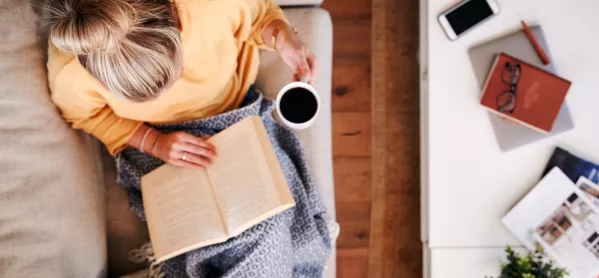- Home
- How to look after your mental health these next weeks
How to look after your mental health these next weeks

Just a quick mental health check-in as we all take a gasp for breath this half term. How are you all doing?
As a psychologist, I was thinking about where you as teachers might be, mentally, this half term. I imagine that, at the start of term, many of you were pleased to be back doing what you love, if somewhat apprehensive about a possible second wave.
As that fear has turned into reality, teaching while trying to keep yourself and others safe must have felt like juggling with jelly - but with rather more serious consequences. The uncertainty and the risks make it an unbelievably stressful time.
Coronavirus: sucking the joy from life
This last half term, I have often thought of a book probably well known to early years and key stage 1 teachers: A Squash and a Squeeze by Julia Donaldson. Do you remember that one? “Wise old man, won’t you help me, please? My house is a squash and a squeeze.”
The wise man advises the old woman to take all her animals into her house, one by one, and it creates mayhem - life becomes much worse. Then, when she kicks out the animals and returns to normal, her small home seems more spacious.
The Covid crisis has taken so much of the joy out of life, and made the mundane and normal so much more complicated. When (if?) life returns to normal, perhaps we will feel grateful - although I hope that it will trigger a revolution of investment in what turns out to be the crucial infrastructure of the world.
So, reflecting on all that, and thinking about mental health, I have two pieces of advice for you this half term.
Be kind to yourself
Firstly, I hope you’ve been kind to yourself this week. If not, you’ve still got a few days left: make sure you’ve given yourself a break.
So much of life is currently rulebound, and so much freedom has been taken away. So don’t create new rules in your head, telling yourself that you must do this or should do that by the end of the week. Listen to your own voice about what you need and want to do in the moment.
Catch up with yourself in a good way: not just with the marking or the laundry. Do that thing that is important to you and you alone, but which there never seems to be time for, because of the marking and the laundry. No student ever missed a life opportunity because their work wasn’t perfectly marked. Good enough is, well, both good (great!) and enough.
Do some holidayish things, whether it’s watching a movie in the afternoon under a blanket, or touching base with old friends.
Try to move your body a bit, in whichever way gives you joy - not in a soulless way to burn calories or look thinner, but in a way that makes your heart sing. Walk in the rain. Kick leaves. Dance in the kitchen. Cook your favourite foods: things that are indulgent, but which also nourish you.
If you can, hug those who are close to you just a little bit longer and listen to them a little bit more, connecting to each of your feelings while knowing you can’t solve someone else’s problems.
So little to look forward to
My second piece of advice? After practising this kindness on yourself, try holding on to it in the next half term, for yourself and others: your colleagues and pupils.
My work in Camhs tells me that the pandemic - including lockdown and social distancing - has been hugely unsettling on nearly all children. So many of the things that we know are crucial to children’s mental health, such as a sense of security and connection to others, have been blown out of the water.
Uncertainty and fear create anxiety; loneliness and a lack of control create helplessness and depression. It is perhaps most difficult for teenagers where their normal developmental trajectory of separation and individuation has been stolen through lockdown. They have so little to look forward to in the future, and all sources of fun have been curtailed now.
Many teenagers keenly feel the relentless expectations placed on them, too: the shoulds and the musts. In Camhs clinics, I am hearing their worries that every piece of work, every test, matters crucially, because what if school shuts tomorrow and the exams are cancelled? They are living each week like it is exam week. I wonder, as adults, whether we can protect them a little bit from this?
So, the medicine is kindness, ingested and then spread liberally from Halloween to Christmas. Day-to-day kindness is all we have to look forward to, so let’s use it generously, on ourselves and on others.
Tara Porter is a clinical psychologist in the NHS and private practice. She also works at the Anna Freud National Centre for Children and Families, and is Tes’ mental health columnist. She tweets as @drtjap. The views expressed are her own
Keep reading for just £1 per month
You've reached your limit of free articles this month. Subscribe for £1 per month for three months and get:
- Unlimited access to all Tes magazine content
- Exclusive subscriber-only stories
- Award-winning email newsletters



